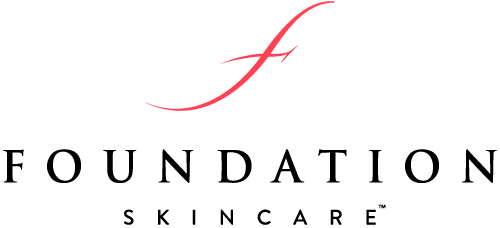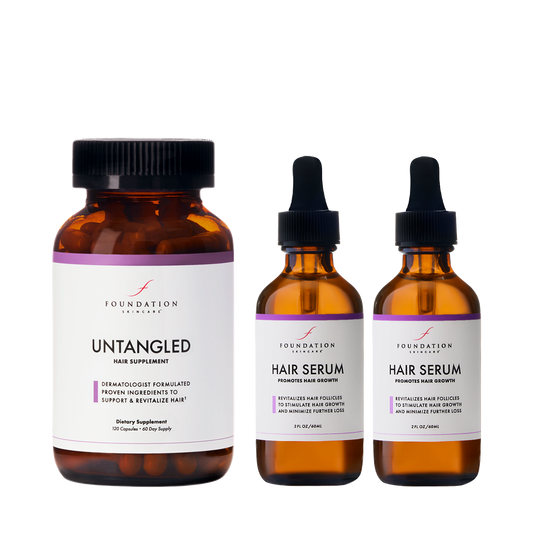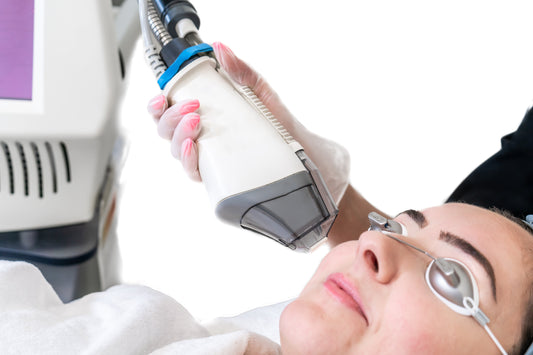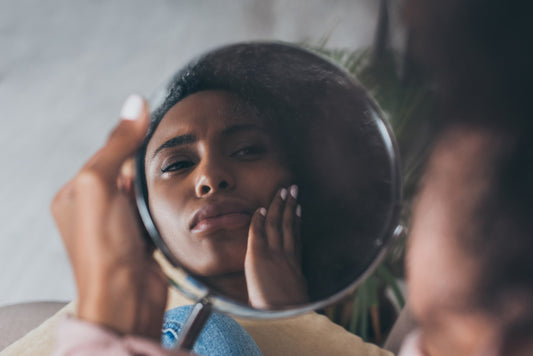Dealing with hair loss can be a frustrating experience, and finding a solution that results in successful regrowth can involve a lot of trial and error. Determining the root cause of hair loss is the first step in learning how to treat it. Since vitamin and mineral deficiency can be a cause of hair loss, it makes sense that supplementing with certain vitamins might be a promising option.
However, what works for one person may not work for someone else, and that can make finding the right option feel overwhelming. While there is no magical way to grow hair overnight, there are some vitamins and minerals that are scientifically proven to help with hair loss. Here’s a look at the vitamins that can stimulate hair growth and help you maintain healthy hair..
How do Vitamins Help in the Hair Regrowth Cycle?
Hair loss, also known as alopecia, is a common condition with many different possible causes. According to Harvard Health, this includes hormonal fluctuations, inherited genetic disorders or inflammatory diseases, cancer, stress, pregnancy, certain medications, substantial weight loss over a short period of time, and recent surgery or illness.
In some cases, hair loss can also be caused by a deficiency of certain vitamins and minerals. Research has found that micronutrients can be important for hair follicle development, as they play a big role in normal cell growth, turnover, and function. They also agree that some science supports the idea that certain vitamins may help with hair loss. Vitamins can provide important nutrients that support growth and nourish follicles.
UnTangled Essentials Kit
• Engineered to work in tandem
• Visibly fuller hair in 90 days
Vitamins & Minerals that Support Hair Growth
While vitamins aren’t an overnight solution to hair loss, many will help over time if taken regularly in the optimal dosage – some patience may be required to give them time to start working in your system. You should also consider that how well they work may also depend on the underlying reasons for hair loss.
Before you start a new supplement in the hopes that it will make your hair grow back, you should always research it thoroughly and speak with your doctor. You should also speak with a doctor before taking certain hair growth products, especially those with high doses of certain vitamins and minerals that may have contraindications with daily supplements or vitamins you may already be taking.
Biotin
Also known as vitamin B7, biotin has a reputation for improving hair growth, but it’s unclear if it actually helps as much as many claim. Biotin is a type of vitamin B that aids in cell metabolism and is the only B vitamin that is not produced by the body. Biotin deficiencies have been associated with hair loss – that said, researchers note that biotin deficiencies are very rare.
According to Cleveland Clinic, biotin helps with the production of keratin, which helps form your hair and nails, and can help with inflammation and maintaining hair growth. If you are struggling with a biotin deficiency, then supplementing with biotin may be useful with associated hair loss; otherwise, over-supplementing with biotin can potentially be harmful. This is one of the reasons why UnTangled Hair Supplement has only 30 mcgs of Biotin, which is 100% USRDA. According to the National Institute of Health, you can also have biotin intake through foods like beef, eggs, salmon, pork chops, sunflower seeds, and sweet potatoes.
Vitamin D
Vitamin D deficiencies include symptoms such as hair loss and dry skin and nails, and studies have shown a link between alopecia and low levels of vitamin D. There are also studies that support the idea that supplementing with vitamin D may help with hair loss, as it has anti-inflammatory effects and can help with the immune system, both of which can play a part in hair growth.
Many of us are vitamin D deficient without realizing it. Note that UVB does not penetrate glass, so you actually have to be outside to get vitamin D from the sun. You can also get vitamin D from foods like fatty fish (salmon, trout, and tuna are ideal), fish liver oil, and some mushrooms, as well as from supplements.
Iron
Research shows that iron deficiencies (the most common nutritional deficiency in the world) are common with women dealing with hair loss. More studies and research are needed to determine if iron can definitely impact hair growth, but some have shown that supplementing with iron may be helpful if you are deficient in it. And it’s worth noting that iron has been shown to be helpful with premature graying as well.
Keep in mind that if you’re going to supplement with iron for hair loss, you’ll also need to supplement with vitamin C. Vitamin C plays an essential role in the absorption of iron in the body, meaning if you take iron without it, your body may not be absorbing it properly. Foundation’s UnTangled supplement includes both vitamin C and iron (as well as all the other vitamins listed here) in optimal amounts for maximum absorption and best results. You can also get iron from your diet. According to Cleveland Clinic, iron-rich foods include lean meat and poultry, seafood like salmon, white beans, lentils, nuts, dried fruits, leafy greens like spinach, and fortified breakfast cereals.
Vitamin E
Vitamin E can help balance antioxidants and protect against free-radical damage. Research has shown that there is a link between alopecia and significantly lower levels of vitamin E. One promising 2010 study found that participants with alopecia areata (an autoimmune disorder that causes hair loss) who supplemented with vitamin E experienced an increase in the number of hair strands they had. Researchers believe it may help reduce oxidative stress in the scalp and encourage hair growth.
You can get some vitamin E from your diet (through foods like sunflower seeds and oil, almonds, and hazelnuts), but you can also supplement with pills or use it topically. Vitamin E supplements usually contain more than the recommended amount per day, according to the NIH, so talk to your doctor before taking it.
Vitamin A
Vitamin A, sometimes also known as retinol, aids in cellular growth and is necessary for healthy skin and hair. However, it’s really important to have the right balance of vitamin A: research has shown that over-consumption of vitamin A can lead to hair loss.
If you have a deficiency of vitamin A, that could contribute to hair loss issues you might be experiencing. If this is the case, then supplementing with vitamin A can help with that hair loss. It’s not recommended to take more than the daily recommended allowance of vitamin A in supplement form without consulting a medical professional first.
Zinc
Zinc is an essential trace element that the body cannot produce on its own, but most people get enough zinc through their daily diet. One side effect of a zinc deficiency is alopecia, and in that case, supplementing with zinc has been shown to lead to hair regrowth. Foundation’s UnTangled supplement contains 100% of the percentage of recommended daily allowance of zinc.
The NIH recommends getting most of your zinc through your diet – it can be found in foods like oysters, meat, fish, poultry, beans, nuts, and whole grains.
Omega-3 Fatty Acids
Omega-3 fatty acids are healthy fats that are essential to proper cell function and provide the body with energy. Supplementing with omega-3s often means taking fish oil, and some studies have also found that fish oil can be beneficial to hair growth. One 2015 study found that women who took a fish oil supplement experienced a significant increase in hair growth and reduction in hair loss.
The best sources of omega-3 fatty acids are through diet, and you can find high levels of them in fatty fishes like mackerel, salmon, and anchovies.
How to Prevent Hair Loss Moving Forward
There are many different causes of hair loss, including genetics, autoimmune disorders, stress and depression, hormones, vitamin and mineral deficiencies, poor diet, and more. Determining the cause is an important part of learning how to prevent and treat hair loss. To maintain healthy hair, keep the below tips in mind:
- Follow the Mediterranean diet: The Mediterranean diet consists of food that are high in unsaturated fat, fiber, and antioxidants and low in saturated fat and animal protein. Research has shown that eating this way can be important in treating hair loss, since it means eating foods that are anti-inflammatory and rich in antioxidants.
- Improve your haircare routine: To maintain healthy hair and prevent some hair loss, the American Academy of Dermatology Association (AAD) recommends taking care of your hair by doing things like always using conditioner, gently massaging shampoo into the scalp, letting hair air dry before brushing it, minimizing heat styling and hair coloring or highlighting, and gently combing hair each day. The AAD also recommends avoiding tight hairstyles that pull on your hair, like tightly pulled buns and ponytails, cornrows, and dreadlocks or hair extensions.
- Try at-home treatments and supplements: The AAD recommends trying at-home options for hair loss that don’t require a prescription, such as products that contain minoxidil or at home laser caps. Foundation Skincare makes an UnTangled Hair Supplement that is formulated with vitamins to help with hair thinning and improve fullness and health. UnTangled is formulated by a board-certified dermatologist who specializes in hair loss and is made with optimal amounts of clinically proven ingredients like vitamins A, C, D, and E, as well as zinc and iron. It can help nourish hair follicles, while increasing the production of keratin to help kick start hair growth. Because it can be hard to get optimal amounts of each vitamin through your daily diet, a supplement like Untangled, which is well-balanced and thoughtfully formulated, is a great way to make sure you’re getting enough of these vitamins, especially if you’re experiencing hair thinning or loss.
- Try professional treatments: You can speak with a doctor or dermatologist to try a professional treatment for hair loss, such as steroid injections, hair transplants, or laser therapy. In some cases, a doctor can also offer prescription medication that may help with hair loss.
Hair loss can be overwhelming, but there are ways to help minimize and treat it, and vitamins and minerals can be helpful in this journey. Find more tips and resources on maintaining healthy hair and skin in the FS Blog.
References:
-
https://www.ncbi.nlm.nih.gov/pmc/articles/PMC9710406/
-
https://www.health.harvard.edu/diseases-and-conditions/vitamins-minerals-and-hair-loss-is-there-a-connection
-
https://www.ncbi.nlm.nih.gov/pmc/articles/PMC6380979/
-
https://www.ncbi.nlm.nih.gov/pmc/articles/PMC6380979/
-
https://health.clevelandclinic.org/is-biotin-as-good-as-advertised-for-your-hair-loss
-
https://www.ncbi.nlm.nih.gov/pmc/articles/PMC6380979/
-
https://ods.od.nih.gov/factsheets/Biotin-HealthProfessional/#h11
-
https://www.ncbi.nlm.nih.gov/pmc/articles/PMC6380979/
-
https://ods.od.nih.gov/factsheets/VitaminD-HealthProfessional/
-
https://www.ncbi.nlm.nih.gov/pmc/articles/PMC6380979/
-
https://my.clevelandclinic.org/health/drugs/14568-iron-oral-supplements-for-anemia
-
https://www.ncbi.nlm.nih.gov/pmc/articles/PMC6380979/
-
https://www.ncbi.nlm.nih.gov/pmc/articles/PMC3819075/
-
https://ods.od.nih.gov/factsheets/Vitamine-HealthProfessional/
-
https://www.ncbi.nlm.nih.gov/pmc/articles/PMC9324272/
-
https://www.ncbi.nlm.nih.gov/pmc/articles/PMC6380979/
-
https://ods.od.nih.gov/factsheets/Zinc-Consumer/
-
https://my.clevelandclinic.org/health/articles/17290-omega-3-fatty-acids
-
https://pubmed.ncbi.nlm.nih.gov/25883641/
-
https://www.ncbi.nlm.nih.gov/pmc/articles/PMC9710406/
-
https://www.aad.org/public/diseases/hair-loss/insider/stop-damage
-
https://www.aad.org/public/diseases/hair-loss/causes/hairstyles
-
https://www.aad.org/public/diseases/hair-loss/treatment/diagnosis-treat
-
https://www.aad.org/public/diseases/hair-loss/treatment/diagnosis-treat





